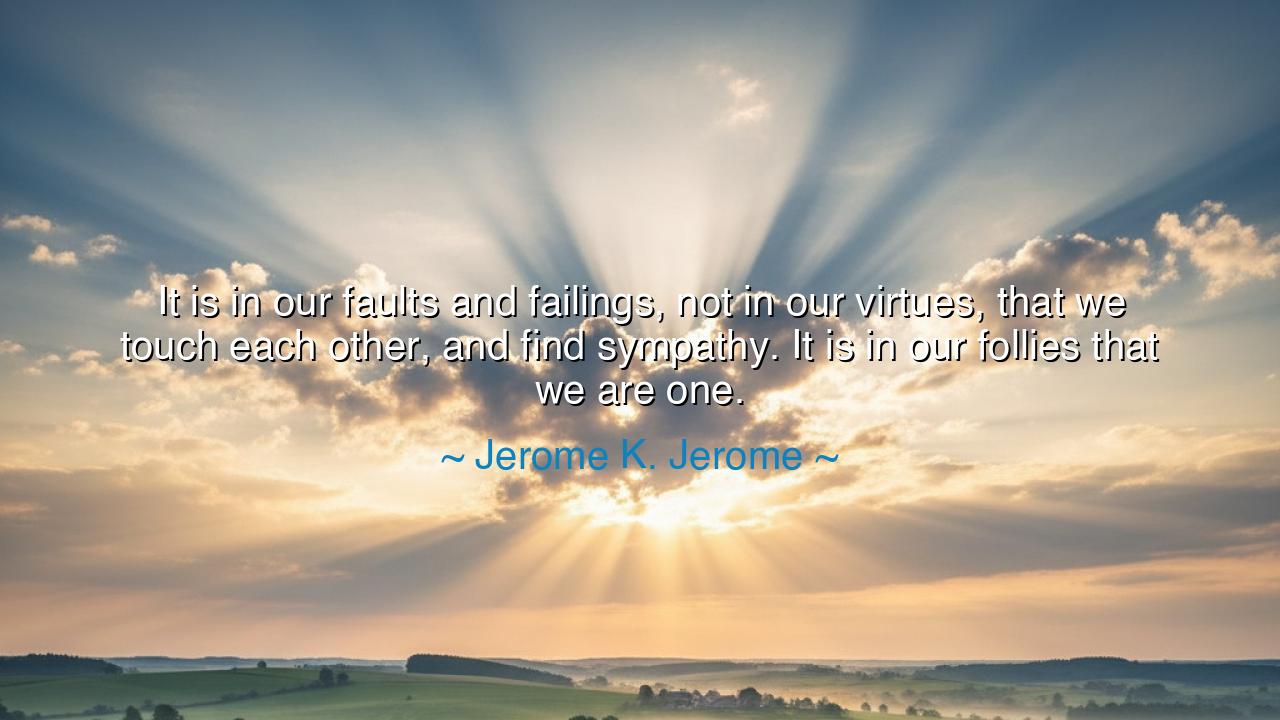
It is in our faults and failings, not in our virtues, that we
It is in our faults and failings, not in our virtues, that we touch each other, and find sympathy. It is in our follies that we are one.






Jerome K. Jerome, the humorist whose wit clothed truth in laughter, once declared: “It is in our faults and failings, not in our virtues, that we touch each other, and find sympathy. It is in our follies that we are one.” These words pierce through the mask of pride and reveal the secret of human kinship. For though we admire the greatness of others, it is in their weakness that we recognize ourselves. Virtue may inspire awe, but it is frailty that binds hearts together.
The ancients themselves understood this paradox. In Homer’s epics, Achilles shines not in his invincibility, but in his grief, his rage, his mistakes. The gods may be worshiped for their power, yet they are distant, cold, untouchable. But when a man stumbles, when he confesses his weakness, he becomes truly human — and in that humanness, he becomes our brother. Jerome’s insight is ancient truth dressed in modern words: that sympathy is not born of perfection, but of shared imperfection.
History too teaches us the same. Abraham Lincoln, remembered as one of the greatest leaders of men, often told stories not of his triumphs, but of his missteps and embarrassments. His ungainly appearance, his self-deprecating humor, his willingness to admit mistakes — these made him beloved by the common people. They saw in him not only a president, but a man who carried the same follies they bore. His greatness was deepened, not diminished, by his faults.
Jerome’s words are also a rebuke to the pride of those who wish to appear flawless. For perfection creates distance. The man who never errs stands apart, like a statue admired but never embraced. It is in the admission of weakness — the faltering step, the foolish word, the shared mistake — that walls crumble and bridges form. Virtues may set us upon pedestals, but failings draw us down into the circle of fellowship, where we discover that we are not alone.
This truth holds wisdom for our daily lives. When we seek to comfort another, it is not by boasting of strength but by confessing our own wounds that we reach them. The grieving heart is not healed by hearing of another’s success, but by hearing of another’s sorrow. The lonely soul is not lifted by tales of perfection, but by the recognition that others too have stumbled, others too have been afraid. In this way, our follies are not shame, but sacred bonds.
What then shall we do? We must cast aside the mask of false perfection and dare to be seen as we are — flawed, fragile, human. Let us tell our stories of failure as well as triumph, that others may find courage in them. Let us embrace not only the polished virtues of our neighbors, but also their weaknesses, their doubts, their fears. For it is there that we find true unity.
So remember, O seekers of truth: it is not in being flawless that you will touch the hearts of others, but in being real. Do not be ashamed of your faults; they are the soil in which sympathy grows. Do not despise your follies; they are the bridges that unite us all. For in our common weakness, we discover our greatest strength — the power to walk together, hand in hand, through the long journey of life.






AAdministratorAdministrator
Welcome, honored guests. Please leave a comment, we will respond soon